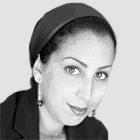To ban or not to ban? Opinion piece from Amnesty International

I am reproducing here a press release from Amnesty International on the Barcelona ban. As promised, I will resume my discussion of the ban and its repercussion in my next post. Spanish politicians urged to reject bans on full-face veils Spain is the third European country this year to consider the banning of full-face veils 29 June 2010 Amnesty International has called on law-makers in the Spanish region of Catalonia not to adopt a motion on Wednesday in favour of banning women from wearing the full-face veil in public buildings and spaces. "Any wide-ranging ban will violate the rights to freedom of expression and religion of those women who choose to wear a full-face veil as an expression of their identity or beliefs," said John Dalhuisen, Amnesty International's expert on discrimination in Europe. "Women should be free to choose what and what not to wear. This is their right under international human rights law. This right extends to forms of dress th




